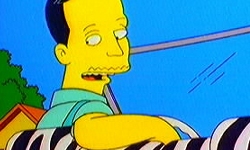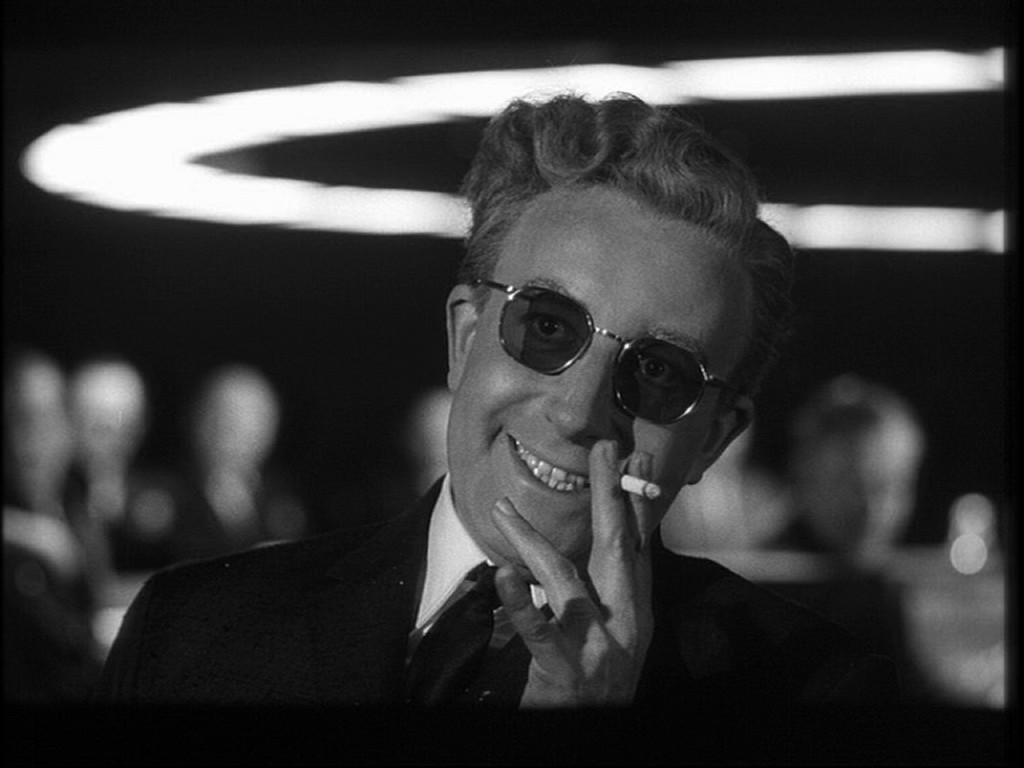
Okay, so it's not my favorite episode. But I do think it has its moments. And it has John Waters, who should have written this episode. Or maybe he could have made a few suggestions, like, I don't know, cut the hokey feel good ending. Any way, the show tries, and I believe it succeeds in bringing homosexuality into households that never would have dared to talk openly about such a subject with their children, or even to themselves.
The episode is about Homer Simpson and how he reacts when he finds out his friend is gay--thus the clever pun of a title "Homer's Phobia". As Andrew brought up in class, this isn't about gays, but about Homer's intolerance of gays. Like most homophobes, it's about not knowing or understanding homosexuals--the not knowing is what scares Homer. When Marge returns from her galavanting about town with John, Homer says to her "Did he give you gay?" To Homer, gay is something you catch. This fear becomes more pronounced when he notices Bart wearing a Hawaiian shirt. A horrified Homer tells Marge that "there's only two kind of guys who wear those shirts: gay guys and big, fat party animals. And Bart doesn't look like a big,fat party animal to me." After he catches his son dancing to "The Shoop Shoop Song" with a Hairspray-style bouffant, Homer freaks out and decides he has to do something.
I love the scene in the car. It represents male bonding between a father and his son. Homer's going to fix Bart and make him straight in a day or less. Homer has a plan (which involves so-called manly activities) and he assures Bart "by tomorrow morning, you'll be a regular Burt Reynolds"--who by Homer's standards is a representation of what a man should be: hairy and virile. It's a very real moment that turns into satire when Homer begins his internal monologue of how he should talk, act, and behave around his son. Homer shows his son that he loves him but doesn't love him because men shouldn't love each other. Homer cares, he just doesn't know any better. He himself has been raised (trained) to be a certain way. Like many fathers, he's unable to escape the 'norm' of being masculine. I believe that every man hates being called out on his masculine/macho-ness (or there lack of). It's threatening. To be called a sissie. Ok, I'll get back on track. I won't go off on gender roles and gender expectations (though it's there and perhaps even satirized).

Another great satirical moment is when Homer has Bart sit in a lawn chair in front of a Laramie Slims cigarette ad. The ad has two young scantily clad women having a pillow fight. The satire is directed at the cigarette advertising and how it is deceitful in its message: Young attractive people having fun and smoking. Cigarette advertising has been under attack for years--probably starting back in the mid-90's, so it was timely I'm sure to make a joke about it.
Situational irony: Two hours later, Homer returns and asks his son how he feels and Bart says: "I dunno. I kinda want a cigarette." Homer wants the boy to see half-naked women and fall in love; boy sees what is actually being advertised: smoking/Laramie Slims cigarettes.
I'd also like to point out a bit of dark comedy which happens while Lisa and Bart are walking around Cockamamie's (John's store). They come across the robot from the movie 'Clank Clank! You're Dead!'
Lisa: Ooh, think of how awful it would be for the poor midget inside.
Bart: Aw, boo hoo. That's what they get paid for.
They walk away and a door inside the robot's chest opens to reveal a tiny little person skeleton.
I'm surprised by Lisa in this scene. She says 'midget'. She's normally politically correct, so it catches me off guard when she says 'midget' instead of 'dwarf' or 'little person'. I'm also surprised by her not giving her dad a speech on tolerance. Lisa wasn't herself in this episode.

The gay steel mill was a great way to satirize gay stereotypes. I mean, I know John Waters was happy to see that even his cartoon self was a bit more butch than his real self--and he was very relieved that his animated self didn't resemble Richard Simmons. An average American household may actually believe that gays are limp-wristed, lispy femmes--i.e. Richard Simmons. So it's ironic, when the masculine steel workers turn out to have lisps and limp wrists. The audience doesn't see gay men as being big strong men. It's shocking, perhaps. This is pre-Brokeback Mountain and remember the reaction that movie had received. People were freaking out because the movie was about two masculine men falling in love with each other.
Again, let's look at when this episode premiered. It was February 1997. Ellen just came out to Oprah--and a few months later her character comes out on her television show. This is pre-Will and Grace. Pre-Queer Eye for the Straight Guy. This is Sunday night, network television, prime time family television. It's quite revolutionary. I thought it was great to hear what you all had to say, and I sometimes forget how young you all are (and how old I am), so telling me you were in junior high, that you were kids, really put it into perspective. Again, it shows the power of a show geared towards families. Jessie's comment on what gay meant prior to seeing the show was quite profound. The term 'gay' was thrown around as a derogatory: "You're gay" or "This is gay" were thrown around as insults meaning "you're dumb" or "this is stupid". Now gay had a face. A different meaning. The power of television, folks. Being exposed to something you weren't exposed to before. The more we see gay, the more normal it becomes.
The Simpsons may be geared for adults, but it's sold to kids. Maybe the show isn't what it used to be. But at least, we have the reruns in syndication to remind us of how good it once was.




No comments:
Post a Comment